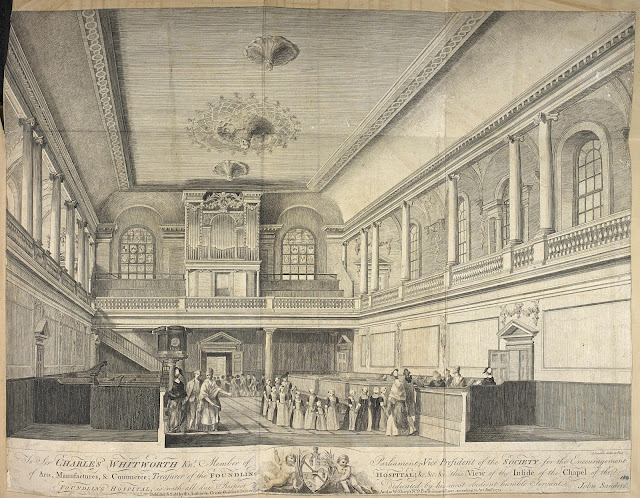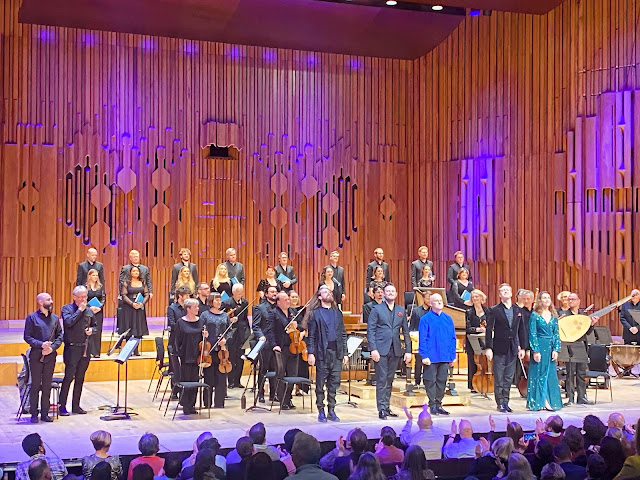 |
| The chapel of the Foundling Hospital where Handel performed Messiah annually |
Handel: Messiah; Anna Devin, Tim Mead, Nick Pritchard, Cody Quattlebaum, Academy of Ancient Music, Laurence Cummings; Barbican Hall
Reviewed 16 December 2024
Sometimes avoiding traditional readings and emphasising contrasts, this was a Messiah where the word was of primary importance, delivered with remarkable directness at times.
I would imagine that neither Handel nor Charles Jennens (who created the libretto) thought of Messiah as a Christmas piece. In fact, for Jennens the work had a purely didactic purpose bringing the Word of God to those in the concert hall, and Messiah narrates the entire arc from Christ’s coming, through his Passion to the Resurrection. Returning to Handel’s Messiah at the Barbican for the first time since 2022 [see my review of that performance]. Laurence Cummings and the Academy of Ancient Music seemed to relish this didactic element, the telling of a narrative as serious and intense as the Passion. The soloists this year were Anna Devin (replacing Louise Alder), Tim Mead, Nick Pritchard and Cody Quattlebaum.
This wasn’t a large-scale performance, an orchestra based on an ensemble of some 14 strings, with a continuo based around two harpsichords (one played by Cummings), organ and theorbo, plus a choir of 18. Not a huge group for the Barbican Hall, but entirely sufficient.
Cummings and the orchestra began the overture with a Grave which was gentle, slow and beautifully phrased, we could indeed be listening to a Passion, though by contrast the Allegro moderato was very much a perky dance. Throughout the evening, Cummings had clearly rethought tempos. This was not a performance that sought to be speedily fast, though there were choruses such as ‘All we like sheep’ where Cummings drew vividly fast runs from his chorus, thankfully some of the other choruses were taken at more sedate speeds, so that ‘Behold the Lamb of God’ felt rather gentle and intimate.
The first half began with tenor Nick Pritchard addressing us directly, as both ‘Comfort ye’ and ‘Every valley’ were sung from memory, straight to us. Throughout the evening, the majority of the recitative was delivered in this manner whilst all of the cast endeavoured to use their copies as a little as possible for the arias. This meant that not only were the words prominent, but we felt that we were being addressed directly, this was an evening where Messiah had a distinct meaning, rather than being a collection of well-known tunes.
There was a certain seriousness of approach in the first half, despite the real joy of the Christmas message about the Coming of Christ. The chorus’ approach was often light, there was a clarity to ‘And he shall purify’ with gentle runs and ‘His yoke is easy’ combined perkiness with lightness and a similar clarity, whilst though ‘Glory to God in the highest’ was briskly exciting it was a tad serious.
Countertenor Tim Mead sang with straight tone and a sense of direct meaning, so ‘But who may abide’ was rather sober, whilst ‘O thou that tellest’ combined rhythmic lift with strong words. Soprano Anna Devin was considered and definite in her opening sequence and whilst there was joy in her final accompagnato, ‘And suddenly’, ‘Rejoice greatly’ felt somewhat serious, though with some terrific passagework. Devin and Mead’s concluding duet, ‘He shall feed his flock’ was similarly gentle and intent. It was left to Cody Quattlebaum to inject a bit of theatricality into things, so that ‘Thus saith the Lord’ was positively fierce whilst ‘For, behold, darkness shall cover the earth’ was sung with lovely covered tone, though the subsequent aria, ‘The people that walked in darkness’ was sober yet relatively straight.
Cummings approach to Part Two seemed to highlight the contrasts between the movements. The great sequence of choruses at the opening began gently, turned brisk with ‘Surely’ and had exaggerated contrasts in ‘And with his stripes’ before brisk runs in ‘All we like sheep’, and a remarkably fierce account of ‘He trusted in God’. ‘Lift up your heads’, by contrast, was quite traditional sounding and very full. ‘The Lord gave the word’ was full of vivid detail, and it was this sense of detail that enlivened an account of the Hallelujah chorus that seemed to deliberately avoid the massive. Though in between these two came a vivid, fierce account of ‘Let us break their bonds asunder’
Tim Mead’s performance of ‘He was despised’ was somewhat low-key, full of meaning yet seeming to avoid big dramatic gestures, though the central section brought out a feeling of contrast, and it was given in a nicely flowing tempo. He made ‘Thou art gone up on high’ similarly full of meaning yet not overdone. Nick Pritchard emphasised the contrasts in his sequence of accompagnato and aria, moving from a vicious ‘All they that see him’, through lyrical directness including a moving ‘Thy rebuke’ to an intimate, confiding version of ‘But thou didst not leave his soul in hell.’ He ended with a firm account of ‘Though shalt break them’ where the words and their meaning took prominence. Anna Devin brought gentle poise to ‘How beautiful are the feet’, and Cody Quattlebaum gave a vivid theatricality to ‘Why do the nations’.
Part Three is more of a problem as there is less sense of narrative here, and some of the items stand out as memorable moments rather than creating a whole. Anna Devin’s approach to ‘I know that my redeemer liveth’ was to make it simple and direct, and this was followed by ‘Since by man came death’ with the chorus giving it plenty of contrast. After his vivid theatricality earlier in the evening, Cody Quattlebaum was relatively contained for ‘Behold, I tell you a mystery’ and ‘The trumpet shall sound’, in the latter giving us lovely long, firm lines, and always words prominent. Tim Mead and Nick Pritchard’s duet, ‘O death, where is they sting’ was urgent, whilst Devin’s final aria, ‘If God be for us?’ though admirably serious and intent, felt slightly too cool. We ended of course with the richly satisfying final pair of choruses.
 |
| Handel: Messiah – Cody Quattlebaum, Nick Pritchard, Laurence Cummings, Tim Mead, Anna Devin, Academy of Ancient Music – Barbican Hall |
Throughout the evening chorus and orchestra were on vivid form, with some fine individual solo moments from the orchestra. This was ultimately a satisfying, yet thought-provoking Messiah, one which seemed to have a distinct sense of message and was worried neither about showing off nor doing the unconventional.
The blog is free, but I’d be delighted if you were to show your appreciation by buying me a coffee.
Elsewhere on this blog
- He would stop writing if there was no-one to perform his music: for composer Stephen Goss’ his latest triple album is all about a celebration of collaboration – interview
- Mad, magical and mesmerising: Tom Coult’s Pieces that Disappear, his debut disc from NMC Records – record review
- The Quest: Inspired by Auden & Isherwoods’ The Ascent of F6, Nathan Williamson’s opera for London Youth Opera has a clear message – interview
- Fine-grained tone & classical style: Kyan Quartet in Beethoven, Schumann & Caroline Shaw at Conway Hall’s Sunday Concert Series – concert review
- Love Lines: deep emotions & island soundscapes in London Sinfonietta’s programme of contemporary Scottish music at Kings Place – concert review
- György Kurtág, Dietrich Fischer Dieskau & Christmas in Regensburg: three personal recordings projects for baritone Benjamin Appl – interview
- Engaging zest: Mike Leigh’s production of Gilbert & Sullivan’s The Pirates of Penzance at ENO with a cast mixing innocence & experience – opera review
- English lyricism and dramatic power: the varied songs of Thomas Pitfield from James Gilchrist and Nathan Williamson – record review
- A sense of place, engagement & sheer enjoyment: In Copisteria del Conte exploring 18th century chamber music from Genoa – record review
- A memorable & touching portrait of an oft-misunderstood composer: words & music by Gustav Holst at the London Song Festival – concert review
- Home








